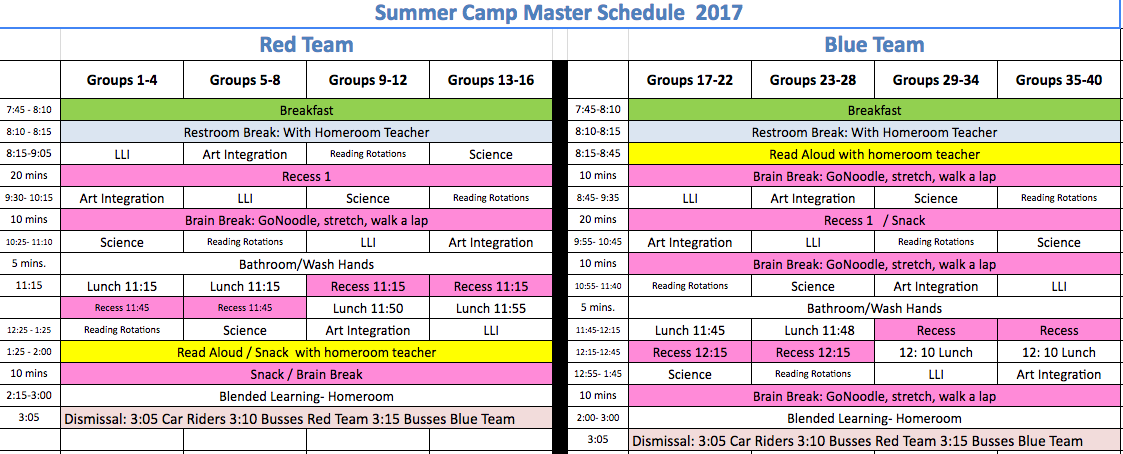
If you know me, you'd know how much I LOVE my job. Teaching, is to me, more than a job, or a profession...teaching to me is a calling...my passion! That's why every summer for the past four years, I've signed up to work in my county's Summer Reading Camp.
This camp is only 3-4 weeks long and it's right in between summer break so it's just perfect. I get a break right after the end of the school year and a break before the beginning of the next school year. Families receive an invitation to register for Summer Reading Camp after EOG. Not all students are invited and/or admitted to camp. Our camp is mainly to support students who are not far below grade level in reading. Also for 3rd-grade students who did not pass the End of Grade Testing and did not meet the targeted reading level. Transportation and meals are provided to all students. Here's an idea of what their day looks like:
So basically students have rotation centers: Art integration, Science, Reading Rotation, and Leveled Literacy Intervention (LLI). Each rotation is about 45 minutes. We take our group to lunch and recess. We also have a block for read-aloud, iReady (computer time), and brain breaks/bathroom breaks. It sounds confusing, but I promise it works out perfectly!
My Assignment:
My assignment has always been LLI. Leveled Literacy Intervention system is an intensive, small-group, supplementary literacy intervention for students who find reading and writing difficult.
I find this system fascinating because it provides a teachers guide and teaching ideas to make reading and writing very interactive promoting student engagement. Not to mention it also provides strong support for English language learning students. Small group instruction for reading and writing is by far my strength! So, even though I appreciate having a guided lesson plan for each book we read, I always end up adding my own twist. Lessons:
Learning about each other: In order to establish a safe and comfortable environment for all my students, we started with an activity where students learned about each other's likes. I placed a poster board sheet in the middle of the table and explained how we are different and similar in many ways. I wrote our group number in the middle and our names branching out from the center. I modeled writing around my name things I like doing or anything I like about me. I modeled sounding out words how it was ok if words were misspelled. Students immediately started brainstorming ideas and adding them to their name. The ending results were amazing!
Why do this activity?!?
Of course, first things first, I wanted to get to know my new students! But this activity turned out to be a great formative assessment. My intentions were to grasp an idea of their writing, reading, speaking, and listening skills. This was a very low anxiety activity where students felt comfortable making mistakes and taking risks in using English. Without my students knowing I was proving them with a scaffolding approach to write complete sentences about themselves. The Writing Process: A Scaffolding Approach is a process to organize writing to meet the needs of your struggling readers and writers.
Vowel Sounds, Word Patterns, and Word-List:
For students who are struggling with vowel sound discrimination, reading grade level text is a torture. Being able to recognize the sound a vowel or a team vowel makes is foundational for readers. Kindergarten through 2nd grade are the grades where students need to master recognizing team vowels sounds and their patterns for written purposes. A student in 3rd grade on should be reading to learn and not having to struggle with phonic foundations. Now for ELL students to achieve high levels of fluency in English, they need to receive sufficient amounts of oral and written input as well as opportunities to express themselves orally and/or in writing. Process:
After reading a story, students get a list of random words taken from the story read and they are to use all of the words to make sentences. The sentences are about what happened in the text so they are familiar with the vocabulary. They are also allowed to look in the text to make sentences. These students here made 5 different sentences! They take turns circling the words needed for each sentence. The final product looks very colorful and they feel very accomplished!
Writing about text:
Here is a great link for tips for using prewriting strategies. Here is another document with great ideas for prewriting strategies.
I had such a great time this summer learning along with my students. I am already looking forward to next summer camp!
Link to all tweets related to our summer school experience!
Thank you for reading!
0 Comments
Your comment will be posted after it is approved.
Leave a Reply. |
Categories
All
Archives
May 2024
|



























